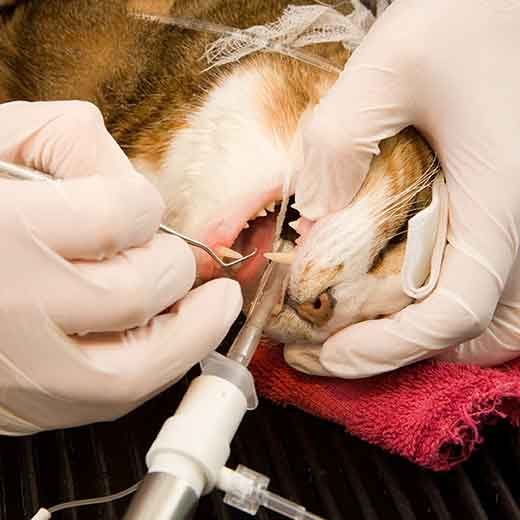Dentistry is an important part of overall health for dogs and cats. Just as humans need to brush their teeth daily and visit the dentist regularly, pets also must have clean teeth for overall good health. Pet owners can perform daily dental care for their dogs and cats to maintain health and prevent serious illnesses. Veterinarians can also provide special services and procedures when necessary.
Pet Oral Health
Pets need regular dental care just like humans do. When a pet receives regular veterinary care, the veterinarian should also check the pet’s teeth to keep the mouth healthy. Some professionals recommend a buddy system. This means that when a pet owner makes their own dental appointment, it’s also time to make an appointment for a dental exam for their pet. A veterinarian can also perform X-rays to evaluate the total health of a pet’s mouth and jaw. When necessary, veterinarians can perform dental cleaning to remove plaque and tartar. Pets usually must have anesthesia before undergoing even cleaning procedures to ensure that veterinarians can perform the procedures effectively without the pet moving and becoming injured. Although anesthesia is relatively safe, veterinarians always prefer to minimize the amount of time a pet spends under sedation. Extensive surgical procedures to extract teeth and treat periodontal disease can be taxing for pets, so veterinarians work to prevent problems whenever possible.
- Dental Hygiene in Dogs and Cats
- Chew on This
- Keeping Your Pet’s Teeth Clean Is Important to Their Overall Health
- Your Dog’s Health (PDF)
- Dental Care Guidelines for Dogs and Cats
- Pet Dental Care
- Pet Dental Care Is a Key to Overall Cat or Dog Health
- Brush Up on the Facts: Pets Need Good Oral Hygiene
Common Problems
As pets age, dental disease becomes a common health issue. Professionals estimate that around 80 percent of dogs and cats over age 3 have some level of dental disease. Untreated, dental disease progresses and can lead to periodontal disease in animals. Periodontal disease often leads to tooth loss, bone erosion, and abscesses. Elevated levels of bacteria in the mouth can lead to serious health issues such as heart disease. Diabetes is another illness that can result from periodontal disease. The chronic gum inflammation can lead to insulin resistance, which is a precursor to diabetes. Pet owners may notice bad breath and excessive drooling in a pet with dental problems. Teeth may also break, fall out, or become discolored. At an advanced stage, a pet will often refuse to eat, and swelling and bleeding may occur. Some owners notice an unusual tilting of the head during eating at this point.
Dental Care for Cats

- Dental Care for Pets
- Professional and Home Dental Care of the Adult Dog and Cat (PDF)
- Influence of Diet on Oral Health in Cats and Dogs
- Dental Care for Your Dog
- Dental Disease
- Dogs and Cats Need Dental Care, Too
- Untreated Dental Issues Can Lead to Major Pain for Pets
- Dental Disease in Cats
- Frequently Asked Questions About Dental Care (PDF)
- The Importance of Your Pet’s Dental Health
Keeping Pets’ Teeth Clean
It may take some practice and conditioning to perform regular tooth-brushing on a dog or cat, but pet owners can make this process a part of daily activities. The first step involves helping a pet feel comfortable about having its mouth and teeth touched. Owners may use a reward system to teach a dog or cat to lie quietly and open its mouth. Wrapping gauze around a finger is an effective way to begin teeth-cleaning. Some owners dip the gauze in broth or tuna water to help a pet accept the new procedure. As a pet becomes familiar with teeth-cleaning, it’s often possible to switch to a pet toothbrush for brushing. Daily brushing is extremely effective for keeping a pet’s teeth clean. Even brushing a pet’s teeth several times a week is helpful. Dogs are often more cooperative with tooth-brushing, but cats may also allow it. Chew toys such as rawhide bones can also be effective for reducing plaque and tartar in a dog’s mouth. Veterinarians may recommend special foods that can help improve dental health. Dentistry experts have found that dogs and cats eating dry food often experience less periodontal disease than pets eating soft or mixed food.
- Simple Steps for Avoiding Infections From Dogs and Cats
- How to Care for Your Pet’s Teeth
- Four Ways to Keep Your Pet Smiling
- Toothbrush Could Cure Pet Bad Breath (PDF)
- Three Pet Grooming Mistakes You Might Be Making
- Home Care for Dogs
- Dental Care and Brushing Your Pet’s Teeth
- How to Clean Your Dog’s Teeth



